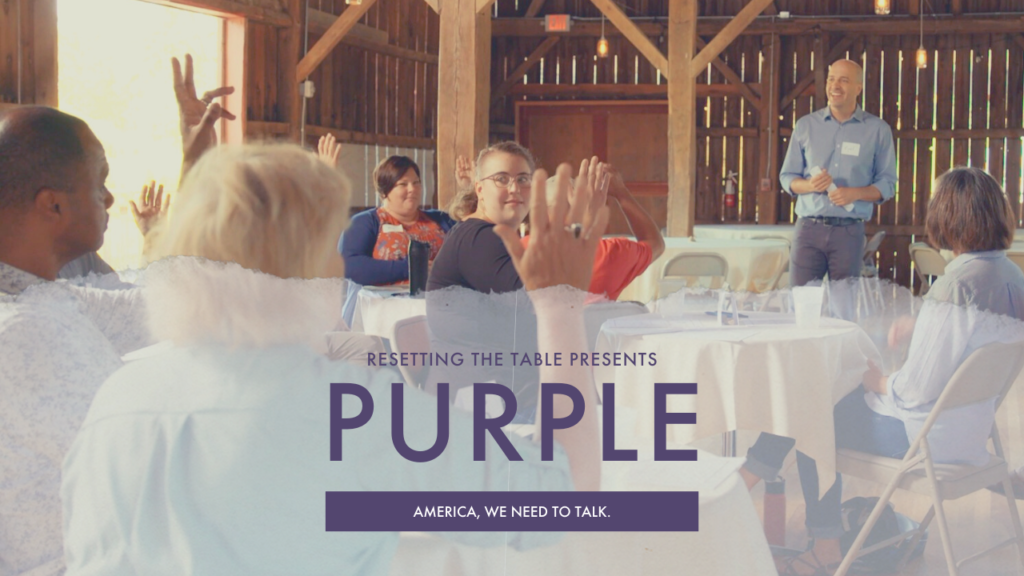
One of the advantages of working in critical-thinking and civics-education communities is that you frequently run into fellow professionals who share the same underlying mission: getting people to talk sensibly and productively about the most important issues facing the world today.
A new colleague introduced me to work her organization, Resetting the Table (RTT), has been doing to help foster citizen engagement across party lines. Over many years, the group honed a set of workshops and techniques for helping individuals and organizations talk through highly contentious issues, including fiery arguments regarding the Middle East.
As our own politics began to take on similar characteristics of those intractable conflicts, such as winner-take-all fights between individuals and groups with hardened positions, the facilitators and educators at RTT began to apply techniques they had developed to conflict resolution in our own troubled polity.
One of their more recent projects is a documentary series called Purple, the first episode of which can be viewed here for free.
Purple takes place in one of the more volatile regions in the country, voting wise, a “swing district” in Wisconsin that voted for Obama in 2008 and 2012, but then went for Trump in 2016.
The film covers a workshop run by RTT facilitators where citizens of the community with different opinions about important matters come together to take on some of the most contentious issues of the day, such as abortion, immigration, and the role of government to support those in need.
One of the things I admired about the workshop covered in Purple is how present the facilitator of the program was, without over-directing the conversation. Once discussion gets going, he seems to appreciate that it is the participants who have to find their way to agreement, or – more frequently – respectful disagreement, rather than be pushed to get to “Yes.” He takes the sting out of differences by shining a light on them and capturing each party’s relationship to those differences on their own terms, then supports the participants to take it from there.
As it turns out, the widely ranging voices in the ensuring discussion did not seem to have huge trouble respecting the beliefs of those they disagreed with. While this might have been due to the format and structure of the event (which included free snacks), I suspect that it was the choice of location that also contributed to the quality of conversations.
One might think that it is in “purple” districts which swing back and forth from red to blue where people would be most at each other’s throats over hot political topics. But if you think about it, places where voters are close to evenly split are places where those with differing opinions are most likely to come into contact in arenas having nothing to do with politics.
What are the odds that the conservative fisherman has a child that went to school where he or she might have interacted with the left-leaning college counselor? Might the religious conservative mother and recent immigrant father have kids who are part of the same scout troop or soccer team? While these particular overlaps are just conjectured examples, my point is that people living in areas where one political opinion does not dominate are more likely – by dint of simple mathematics – to have respectful, professional and even personal relationships with people through communities (schools, civic groups, religious institutions) that are indifferent to the political orientation of participants
Purple teaches us the value of actually sitting down and talking to flesh-and-blood human beings, rather than treating them like abstractions or stand-ins for particular political beliefs. It’s easy to condemn a protestor as a criminal, or a cop as a killer if you don’t know any protestors or cops. So even as we continue to be forced to interact with others through Zoom, e-mail and social media due to pandemic isolation, we need to work all the harder to appreciate that the person we are communicating with or writing about has a backstory and inner life just as complicated and meaningful as our own.
I also thought the cast of Purple had something to teach those of us who do not live in a swing district. I don’t think it’s an accident that their conversation was much more civilized than similar political discussions I’ve engaged in with people who share my political opinions where disagreement over small differences often leads to shouting and even personal rifts.
Perhaps RTT should consider two more seasons of the series called Red and Blue that can help people surrounded by the like-minded hold more productive conversations about what they hold most dear and appreciate that those who disagree with them are not aliens to be dissected at a distance, but real people whose opinions are worthy of respect.
Speaking of seasons, the first series of Purple episodes was cut short by COVID 19, although you can find out more about what’s happening with the documentary and organize a screening for your community by visiting the Purple web site.
Leave a Reply